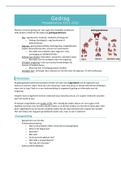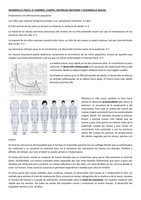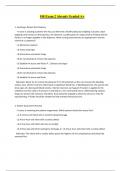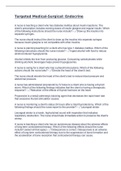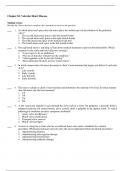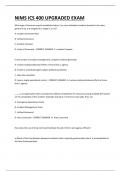George is responsible for Lennie. In the beginning of the novella George says to Lennie “Gi’me that
mouse!” George is said to say this “brusquely”, the exclamaton point Steinbeck included at the end
of the sentence, and the word “brusquely” give the image that George is forceful and angry. This
could be because he wants to train into Lennie that he should not touch or play with anything he
shouldn’t, trying to avoid trouble before Lennie kills anything bigger, which we see he does anyway.
We see George’s responsibility again at the end of the novella when George has to kill Lennie, “you
hadda, George. I swear you hadda” Slim says to George. This illustrates to the audience that Lennie
is George’s responsibility, and George is accountable to clean up Lennie’s mistakes. This links to the
religious story of My Brother’s Keeper, another religious parallel in the complex novella. The story
covers the queston of should man be alone in the world or help others who are less fortunate?
George represents the later in the novella, as he makes himself liable for Lennie. However, at the
end of the novella when George had to kill Lennie he is lef to be alone a like the other men on the
ranch.
George could represent Adam, from the Bible, a doomed man who longs to return to Eden.
Steinbeck gives George the last name “Milton”, the same last name as Milton who wrote Paradise
Lost. Paradise Lost is a poem which tells the story of Adam and Eve afer they have fallen from the
Garden of Eden. Their fall causes the doom of mankind, now destned to walk the Earth alone
forever. Many believe George signifes Adam, and his one chance to avoid this fate is Lennie.
Steinbeck was a big believer in fate, and George’s own name could symbolise how he is
predetermined for the inevitable. He inherited his last name, and there was nothing he could do to
change that, much a like his fate. However, Lennie does not save George from his fate, as George
has to kill him. This poem has many similarites to Steinbeck’s novella, another example could be the
farm they dream of represents Eden. But the angels guarding the Garden of Eden are the problems
Lennie causes.
George gives up on dreams. He says “I think I knew we’d never do her”, he says when talking about
his dream of owning a farm. This illustrates how George had hope throughout the novella, but it was
only a small bit of hope as he confesses he knew of the harsh realites of life. George represents
thousands of 1903s Americans whose dreams where destroyed, as the fragile state of the economy
meant their only reliable way of getng income was being a migrant worker and this lef no room to
achieve dreams. Some may argue that the dream had been alive untl the moment George kills
Lennie, when this happens he is lef to be like every other migrant worker, alone. George is
sentenced to the scenario described by Crooks, “Nobody ever gets to Heaven, and nobody gets no
land.” Crooks describes how no one gets their dreams and this is true with George. Afer killing his
only real friend, he has no companion which leads to no future. Another way in which we see how
dreams would never be achieved in the very opening chapter, before we even meet George and
Lennie the path they will walk down is described by Steinbeck as “a path beaten hard by boys
coming down from ranches”, this illustrates how Steinbeck is grouping all ranch workers together.
Ultmately they are all workers who have no future.
George has power over Lennie. This can be seen at the very beginning of the novella when they walk
along the path “one stayed behind the other”. We know George is the one in front and Steinbeck
may have included this to show George leads Lennie, and Lennie will follow him wherever he goes.
Steinbeck compares Lennie to an animal periodically throughout the novella, and it is suggested here
as Lennie seems to be like a dog following his owner. Another way George has power over Lennie is
by telling him what to do, “You keep away from her, cause she’s a ratrap if I’ve ever seen one”
George says to Lennie about Curley’s Wife as he tries to stop Lennie from getng into trouble. Lennie
mouse!” George is said to say this “brusquely”, the exclamaton point Steinbeck included at the end
of the sentence, and the word “brusquely” give the image that George is forceful and angry. This
could be because he wants to train into Lennie that he should not touch or play with anything he
shouldn’t, trying to avoid trouble before Lennie kills anything bigger, which we see he does anyway.
We see George’s responsibility again at the end of the novella when George has to kill Lennie, “you
hadda, George. I swear you hadda” Slim says to George. This illustrates to the audience that Lennie
is George’s responsibility, and George is accountable to clean up Lennie’s mistakes. This links to the
religious story of My Brother’s Keeper, another religious parallel in the complex novella. The story
covers the queston of should man be alone in the world or help others who are less fortunate?
George represents the later in the novella, as he makes himself liable for Lennie. However, at the
end of the novella when George had to kill Lennie he is lef to be alone a like the other men on the
ranch.
George could represent Adam, from the Bible, a doomed man who longs to return to Eden.
Steinbeck gives George the last name “Milton”, the same last name as Milton who wrote Paradise
Lost. Paradise Lost is a poem which tells the story of Adam and Eve afer they have fallen from the
Garden of Eden. Their fall causes the doom of mankind, now destned to walk the Earth alone
forever. Many believe George signifes Adam, and his one chance to avoid this fate is Lennie.
Steinbeck was a big believer in fate, and George’s own name could symbolise how he is
predetermined for the inevitable. He inherited his last name, and there was nothing he could do to
change that, much a like his fate. However, Lennie does not save George from his fate, as George
has to kill him. This poem has many similarites to Steinbeck’s novella, another example could be the
farm they dream of represents Eden. But the angels guarding the Garden of Eden are the problems
Lennie causes.
George gives up on dreams. He says “I think I knew we’d never do her”, he says when talking about
his dream of owning a farm. This illustrates how George had hope throughout the novella, but it was
only a small bit of hope as he confesses he knew of the harsh realites of life. George represents
thousands of 1903s Americans whose dreams where destroyed, as the fragile state of the economy
meant their only reliable way of getng income was being a migrant worker and this lef no room to
achieve dreams. Some may argue that the dream had been alive untl the moment George kills
Lennie, when this happens he is lef to be like every other migrant worker, alone. George is
sentenced to the scenario described by Crooks, “Nobody ever gets to Heaven, and nobody gets no
land.” Crooks describes how no one gets their dreams and this is true with George. Afer killing his
only real friend, he has no companion which leads to no future. Another way in which we see how
dreams would never be achieved in the very opening chapter, before we even meet George and
Lennie the path they will walk down is described by Steinbeck as “a path beaten hard by boys
coming down from ranches”, this illustrates how Steinbeck is grouping all ranch workers together.
Ultmately they are all workers who have no future.
George has power over Lennie. This can be seen at the very beginning of the novella when they walk
along the path “one stayed behind the other”. We know George is the one in front and Steinbeck
may have included this to show George leads Lennie, and Lennie will follow him wherever he goes.
Steinbeck compares Lennie to an animal periodically throughout the novella, and it is suggested here
as Lennie seems to be like a dog following his owner. Another way George has power over Lennie is
by telling him what to do, “You keep away from her, cause she’s a ratrap if I’ve ever seen one”
George says to Lennie about Curley’s Wife as he tries to stop Lennie from getng into trouble. Lennie




